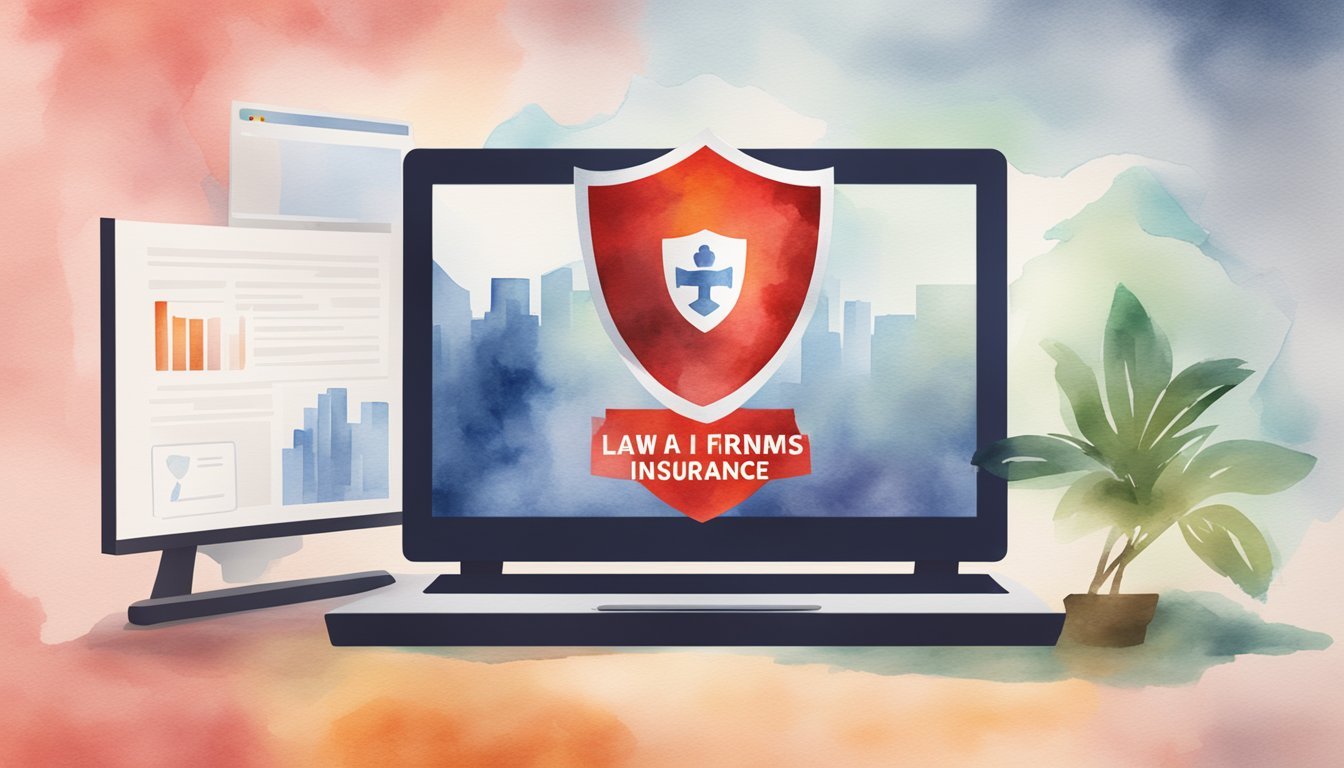Cyber Liability Insurance for Law Firms: Essential Protection in the Digital Age

Law firms handle sensitive client information daily, making them prime targets for cybercriminals.
Cyber liability insurance offers a safety net against these digital threats. Cyber liability insurance protects law firms from financial losses due to data breaches, hacking, and other cyber incidents.

Many lawyers believe their professional liability insurance covers cyber risks, but this isn’t always true.
Cyber liability policies can cover costs like client notifications, data recovery, and legal fees after a breach.
They may also help with business interruption and reputation management.
Investing in cyber insurance is crucial for law firms of all sizes.
Even small firms are at risk, with solo practitioners paying an average of $4,004 per cyber claim.
As cyber threats evolve, having the right coverage can mean the difference between a minor setback and a major crisis for your firm.
Key Takeaways
- Cyber liability insurance is essential for protecting law firms from financial losses due to cyber incidents
- Coverage can include costs for client notifications, data recovery, and legal fees after a breach
- Investing in cyber insurance is crucial for law firms of all sizes, as even small firms face significant cyber risks
Understanding Cyber Liability Insurance
Cyber liability insurance protects law firms from financial losses due to digital threats.
It covers costs related to data breaches, hacking, and other cyber incidents.
What Is Cyber Liability Insurance?
Cyber liability insurance is a specialized policy that safeguards your law firm against cyber risks.
It helps cover expenses if your firm experiences a data breach or cyberattack.
This insurance can pay for:
- Client notification costs
- Credit monitoring for affected individuals
- Legal fees
- Regulatory fines
- Data recovery expenses
Cyber insurance is crucial because traditional liability policies often don’t cover digital risks.
As cyber threats grow, having this protection is becoming more important for law firms of all sizes.
The Distinction Between First-Party and Third-Party Coverage
Cyber liability insurance typically offers two main types of coverage: first-party and third-party.
First-party coverage protects your law firm directly.
It covers costs you incur from a cyber incident, such as:
- Lost income during downtime
- Data restoration
- Crisis management
Third-party coverage protects you from claims made by clients or others affected by a breach at your firm.
This can include:
- Legal defense costs
- Settlements or judgments
- Regulatory fines
You can choose first-party coverage, third-party coverage, or both, depending on your firm’s needs and risk level.
Cyber Risks Specific to Law Firms
Law firms face unique cyber threats due to the sensitive nature of their work.
These risks can have severe consequences for legal professionals and their clients.
Common Cyber Threats to Law Firms
Cyber attacks on law firms often target confidential client information.
Hackers use tactics like phishing emails to trick lawyers into revealing passwords or downloading malware.
Ransomware is another major threat.
It locks up your files and demands payment to release them.
This can be devastating for a law firm that needs constant access to case files.
Data breaches through unsecured networks or devices are common too.
You might accidentally expose client data when working remotely on public Wi-Fi.
Insider threats pose a risk as well.
Disgruntled employees or contractors might steal or leak sensitive information.
The Impact of Data Breaches on Legal Professionals
A data breach can have serious consequences for your law firm. Client trust is crucial in the legal field, and a breach can damage your reputation severely.
You may face legal action from affected clients.
This can lead to costly lawsuits and settlements.
Regulatory bodies might impose fines for failing to protect client data.
These penalties can be substantial.
The financial impact goes beyond fines.
You’ll likely need to invest in breach remediation, including:
- Notifying affected clients
- Providing credit monitoring services
- Upgrading your security systems
Your firm may also lose business as clients move to competitors they perceive as more secure.
This loss of revenue can be long-lasting.
Legal Considerations and Compliance
Law firms must navigate complex legal and regulatory requirements when obtaining cyber liability insurance.
Protecting client data and intellectual property is crucial for compliance and maintaining trust.
Regulatory Requirements for Law Firms
Law firms need to comply with various data protection regulations.
The American Bar Association’s Model Rules of Professional Conduct require lawyers to safeguard client information.
You must ensure your cyber insurance policy meets these standards.
Many states have specific data breach notification laws that apply to law firms.
Your policy should cover the costs of notifying clients in case of a breach.
Some insurers may require you to implement specific security measures.
These could include encryption, multi-factor authentication, and regular security audits.
Meeting these requirements can help you qualify for better coverage and rates.
Intellectual Property and Confidential Information
As a law firm, you handle sensitive client information and valuable intellectual property daily.
Your cyber insurance policy should explicitly cover data breaches involving this type of information.
Look for policies that include coverage for:
- Theft of client trade secrets
- Unauthorized access to confidential merger and acquisition data
- Loss of patentable information
Your policy should also cover legal fees and damages if a client sues you for failing to protect their intellectual property.
Be aware that some policies may have exclusions for certain types of data or industries.
Consider adding endorsements to your policy for specialized coverage related to intellectual property protection.
This can provide an extra layer of security for your firm and clients.
Cybersecurity Measures and Best Practices
Law firms need strong data protection.
Your firm can take steps to guard against cyber threats.
Let’s look at key security measures and a guide for keeping your data safe.
Implementing Data Security Measures
Start by setting up strong passwords for all accounts.
Use two-factor authentication when possible.
Encrypt sensitive data, both in storage and during transfer.
Train your staff on security best practices.
Teach them to spot phishing emails and other common threats.
Make sure they know how to handle client data safely.
Use firewalls and keep all software up-to-date.
This includes your operating systems, antivirus programs, and legal software.
Regular updates patch security holes that hackers might exploit.
Back up your data regularly.
Store backups in a secure, off-site location.
This can help you recover quickly if you face a ransomware attack or data loss.
Law Firm Data Security Guide
Create a written security policy for your firm.
This should cover how to handle client data, use devices, and respond to security incidents.
Limit access to sensitive data.
Only give staff the access they need to do their jobs.
Use role-based access controls to manage permissions.
Consider moving to secure cloud services.
Many cloud providers offer robust security features.
They often have teams dedicated to protecting your data.
Plan for cyber incidents.
Have a response plan ready.
Know who to call and what steps to take if you detect a breach.
Quick action can limit damage and protect your clients.
The Cost of Cyber Liability Insurance

Cyber liability insurance prices vary widely based on several factors.
Law firms need to understand what impacts premiums and how to budget for this important coverage.
Factors Influencing Insurance Premiums
Your law firm’s size and revenue affect cyber insurance costs.
Larger firms with higher income typically pay more.
The amount and type of data you handle also matters.
Firms dealing with sensitive client information face higher premiums.
Your security measures play a big role too.
Strong cybersecurity practices can lower costs.
This includes using firewalls, encryption, and staff training.
Your claims history impacts prices as well.
Previous breaches may increase your rates.
The coverage limits and deductibles you choose affect premiums.
Higher limits mean higher costs.
But they also provide more protection. Cyber liability insurance can cover various expenses like legal fees and data recovery.
Budgeting for Cyber Insurance
To budget for cyber insurance, start by assessing your risks.
Look at your data types and security measures.
Get quotes from multiple insurers to compare prices.
Consider your firm’s financial situation.
Weigh the cost of insurance against potential breach expenses.
Remember, a single cyber incident can be very costly.
For small law firms, cyber insurance might seem expensive.
But it’s often more affordable than you think.
Some insurers offer tailored plans for smaller businesses.
Think about cyber insurance as an investment in your firm’s future.
It protects your finances and reputation.
Include it in your annual budget planning.
Assessing Your Law Firm’s Coverage Needs
Figuring out the right cyber insurance for your law firm takes careful thought.
You need to look at your specific risks and how much protection you really need.
Determining Adequate Coverage
To decide on proper coverage, start by looking at your firm’s size and client base.
Small firms may need less coverage than large ones with many clients.
Think about the types of data you handle.
If you deal with sensitive info like financial records or medical data, you’ll want more protection.
Look at your current security measures.
Strong cybersecurity might lower your coverage needs.
But don’t skimp – cyber threats change fast.
Consider these key areas for coverage:
- Data breach response costs
- Business interruption losses
- Cyber extortion payments
- Legal defense expenses
- Regulatory fines and penalties
Get quotes from several insurers.
Compare policy limits and deductibles.
Make sure the coverage fits your budget and risk level.
Evaluating Potential Liabilities
To assess your liabilities, review your firm’s digital footprint.
Look at where you store client data and how you share it.
Cloud services and email are common weak spots.
Think about your staff’s tech habits.
Do they use personal devices for work? This can increase risk.
List out possible cyber incidents:
- Hacking of client files
- Ransomware attacks
- Phishing scams
- Lost or stolen devices
- Accidental data leaks
Estimate the costs of each scenario.
Include direct costs like data recovery and indirect costs like reputation damage.
This helps you decide how much coverage you need.
Check if your professional liability insurance covers cyber incidents.
Many don’t, so you might need a separate cyber policy.
The Role of Legal Practice Management Software

Legal practice management software plays a crucial role in enhancing cybersecurity for law firms.
It provides tools to protect sensitive data and integrate with IT consultants for better security.
Enhancing Cybersecurity with Technology
Legal practice management software improves your law firm’s cybersecurity in several ways.
It offers secure cloud storage for client data, reducing the risk of physical theft or loss.
These systems often include built-in encryption and access controls to protect sensitive information.
You can use the software to set up multi-factor authentication, making it harder for unauthorized users to access your accounts.
Many platforms also provide regular security updates to address new threats.
By using practice management software, you can:
- Track document access and changes
- Securely share files with clients
- Implement data backup and recovery features
These tools help you meet ethical obligations for client confidentiality and data protection.
Integrating Clio Certified IT Consultants
Clio Certified IT Consultants can help you maximize the security benefits of your practice management software.
These experts understand the unique needs of law firms and can tailor your software setup for optimal protection.
IT consultants can:
- Configure your software’s security settings
- Train your staff on best practices
- Set up firewalls and other security measures
- Monitor your systems for potential threats
By working with certified consultants, you ensure your practice management software integrates smoothly with your existing computer systems.
This helps create a comprehensive security strategy for your firm’s electronic data.
IT professionals can also help you stay compliant with data protection regulations, reducing your risk of penalties or liability claims.
Responding to Cyber Incidents

Quick action and clear communication are key when facing a cyber attack.
A well-planned response can help minimize damage and maintain client trust.
Incident Response Planning
You need a solid plan before a cyber incident happens.
Create a response team with clear roles.
Include IT staff, legal counsel, and PR experts.
Write down step-by-step procedures for different types of attacks.
Test your plan regularly through drills.
This helps find weak spots.
Update contact lists often.
Make sure everyone knows who to call and when.
Keep digital copies of your plan in a secure, offline location.
You might lose access to online systems during an attack.
Notification and Client Communication
Quick, honest communication is crucial after a breach.
Tell clients what happened and how it affects them.
Be clear about what you’re doing to fix the problem.
Follow legal requirements for breach notifications.
These vary by state and country.
Your cyber insurance may cover notification costs.
Use secure channels to contact clients.
Avoid email if it’s compromised.
Consider setting up a hotline or secure web portal for updates.
Be ready for media questions.
Have prepared statements.
Stick to facts and avoid speculation.
Show you’re taking the incident seriously and protecting client interests.
Insurance Provider Selection Criteria

Choosing the right cyber liability insurance provider is crucial for law firms.
You need to consider several factors to ensure you get the best coverage for your needs.
Evaluating Insurance Providers
Look for providers with experience in cyber insurance for law firms.
Check their financial stability and ratings from independent agencies.
Ask about their claims process and response times.
A quick response is vital during a cyber incident.
Consider the provider’s cybersecurity expertise.
Do they offer risk assessments or incident response services?
Compare quotes from multiple providers.
Don’t just focus on price – examine the coverage offered.
Read customer reviews and ask for references from other law firms.
This can give you insights into the provider’s service quality.
Understanding Policy Limits and Exclusions
Carefully review policy limits.
These set the maximum amount the insurer will pay for a claim.
Make sure the limits are high enough to cover potential losses.
Consider your firm’s size and client base when deciding on limits.
Pay close attention to policy exclusions.
These are situations or events not covered by the policy.
Common exclusions might include:
- Acts of war
- Unencrypted devices
- Social engineering attacks
Ask about sub-limits for specific coverage areas.
These can limit payouts for certain types of claims.
Be aware of retroactive dates.
Claims from incidents before this date may not be covered.
Financial and Legal Implications of a Cyber Attack

Cyber attacks can have severe financial and legal consequences for law firms.
You need to understand the costs involved and how to protect your firm.
Calculating the Costs of Downtime and Recovery
When your law firm faces a cyber attack, the financial impact can be substantial.
You’ll likely experience downtime, which means lost billable hours and revenue.
The average cost of downtime for a law firm can range from thousands to tens of thousands of dollars per hour.
Recovery efforts also come with a price tag.
You may need to hire IT specialists to restore your systems and data.
This can be expensive, especially if you require urgent assistance.
Legal implications can add to your costs.
You might face lawsuits from clients whose data was compromised. Defending against these claims can be costly and time-consuming.
You’ll also need to consider notification expenses.
Many jurisdictions require you to inform affected clients about data breaches.
This process can be complex and expensive, especially for large firms.
Data recovery itself can be a significant expense.
If your backups are compromised, you may need to pay for specialized services to retrieve lost information.
Cyber liability insurance can help cover these costs.
It typically includes:
- Direct expenses from data breaches
- Legal fees for lawsuits
- Notification costs
- Data recovery expenses
By understanding these potential costs, you can better prepare your firm and make informed decisions about cybersecurity measures and insurance coverage.
Prevention and Education as Key Assets

Law firms can strengthen their cyber defenses through proactive measures.
Focusing on prevention and education helps protect sensitive data and reduces the risk of costly breaches.
Employee Training and Awareness
Your firm’s employees are the first line of defense against cyber threats.
Regular training sessions keep staff up-to-date on the latest risks.
Teach them to spot phishing emails and suspicious links.
Create clear guidelines for handling client data.
Emphasize the importance of strong passwords and two-factor authentication.
Conduct simulated phishing tests to assess staff readiness.
Encourage a culture of cybersecurity awareness.
Reward employees who report potential threats.
Make it easy for staff to ask questions about security concerns.
Learning from Past Cyber Attacks
Analyze previous attacks on law firms to improve your defenses.
Study the tactics used by hackers to breach legal systems.
Identify common vulnerabilities in law firm networks.
Update your security protocols based on these lessons.
Implement stronger firewalls and intrusion detection systems.
Regularly patch software vulnerabilities to close known security gaps.
Consider hiring ethical hackers to test your systems.
They can find weak points before real attackers do.
Use their findings to strengthen your cyber defenses.






